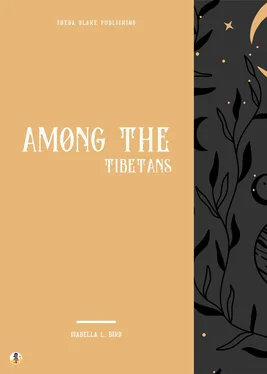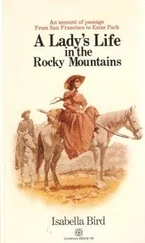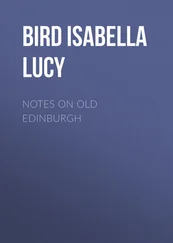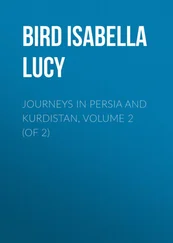Isabella L. Bird
Among the Tibetans
First published by Sheba Blake Publishing Corp. 2021
Copyright © 2021 by Isabella L. Bird
All rights reserved. No part of this publication may be reproduced, stored or transmitted in any form or by any means, electronic, mechanical, photocopying, recording, scanning, or otherwise without written permission from the publisher. It is illegal to copy this book, post it to a website, or distribute it by any other means without permission.
Isabella L. Bird asserts the moral right to be identified as the author of this work.
Sheba Blake Publishing Corp.
2288 Crossrail Dr
Atlanta, GA 30349
support@shebablake.com
First edition
Cover art by Sheba Blake
Editing by Sheba Blake
This book was professionally typeset on Reedsy
Find out more at reedsy.com


The Vale of Kashmir is too well known to require description. It is the ‘happy hunting-ground’ of the Anglo-Indian sportsman and tourist, the resort of artists and invalids, the home of pashm shawls and exquisitely embroidered fabrics, and the land of Lalla Rookh. Its inhabitants, chiefly Moslems, infamously governed by Hindus, are a feeble race, attracting little interest, valuable to travellers as ‘coolies’ or porters, and repulsive to them from the mingled cunning and obsequiousness which have been fostered by ages of oppression. But even for them there is the dawn of hope, for the Church Missionary Society has a strong medical and educational mission at the capital, a hospital and dispensary under the charge of a lady M.D. have been opened for women, and a capable and upright ‘settlement officer,’ lent by the Indian Government, is investigating the iniquitous land arrangements with a view to a just settlement.
I left the Panjab railroad system at Rawul Pindi, bought my camp equipage, and travelled through the grand ravines which lead to Kashmir or the Jhelum Valley by hill-cart, on horseback, and by house-boat, reaching Srinagar at the end of April, when the velvet lawns were at their greenest, and the foliage was at its freshest, and the deodar-skirted mountains which enclose this fairest gem of the Himalayas still wore their winter mantle of unsullied snow. Making Srinagar my headquarters, I spent two months in travelling in Kashmir, half the time in a native house-boat on the Jhelum and Pohru rivers, and the other half on horseback, camping wherever the scenery was most attractive.
By the middle of June mosquitos were rampant, the grass was tawny, a brown dust haze hung over the valley, the camp-fires of a multitude glared through the hot nights and misty moonlight of the Munshibagh, English tents dotted the landscape, there was no mountain, valley, or plateau, however remote, free from the clatter of English voices and the trained servility of Hindu servants, and even Sonamarg, at an altitude of 8,000 feet and rough of access, had capitulated to lawn- tennis. To a traveller this Anglo-Indian hubbub was intolerable, and I left Srinagar and many kind friends on June 20 for the uplifted plateaux of Lesser Tibet. My party consisted of myself, a thoroughly competent servant and passable interpreter, Hassan Khan, a Panjabi; a seis, of whom the less that is said the better; and Mando, a Kashmiri lad, a common coolie, who, under Hassan Khan’s training, developed into an efficient travelling servant, and later into a smart khitmatgar.
Gyalpo, my horse, must not be forgotten—indeed, he cannot be, for he left the marks of his heels or teeth on every one. He was a beautiful creature, Badakshani bred, of Arab blood, a silver-grey, as light as a greyhound and as strong as a cart-horse. He was higher in the scale of intellect than any horse of my acquaintance. His cleverness at times suggested reasoning power, and his mischievousness a sense of humour. He walked five miles an hour, jumped like a deer, climbed like a yak, was strong and steady in perilous fords, tireless, hardy, hungry, frolicked along ledges of precipices and over crevassed glaciers, was absolutely fearless, and his slender legs and the use he made of them were the marvel of all. He was an enigma to the end. He was quite untamable, rejected all dainties with indignation, swung his heels into people’s faces when they went near him, ran at them with his teeth, seized unwary passers-by by their kamar bands, and shook them as a dog shakes a rat, would let no one go near him but Mando, for whom he formed at first sight a most singular attachment, but kicked and struck with his forefeet, his eyes all the time dancing with fun, so that one could never decide whether his ceaseless pranks were play or vice. He was always tethered in front of my tent with a rope twenty feet long, which left him practically free; he was as good as a watchdog, and his antics and enigmatical savagery were the life and terror of the camp. I was never weary of watching him, the curves of his form were so exquisite, his movements so lithe and rapid, his small head and restless little ears so full of life and expression, the variations in his manner so frequent, one moment savagely attacking some unwary stranger with a scream of rage, the next laying his lovely head against Mando’s cheek with a soft cooing sound and a childlike gentleness. When he was attacking anybody or frolicking, his movements and beauty can only be described by a phrase of the Apostle James, ‘the grace of the fashion of it.’ Colonel Durand, of Gilgit celebrity, to whom I am indebted for many other kindnesses, gave him to me in exchange for a cowardly, heavy Yarkand horse, and had previously vainly tried to tame him. His wild eyes were like those of a seagull. He had no kinship with humanity.
In addition, I had as escort an Afghan or Pathan, a soldier of the Maharajah’s irregular force of foreign mercenaries, who had been sent to meet me when I entered Kashmir. This man, Usman Shah, was a stage ruffian in appearance. He wore a turban of prodigious height ornamented with poppies or birds’ feathers, loved fantastic colours and ceaseless change of raiment, walked in front of me carrying a big sword over his shoulder, plundered and beat the people, terrified the women, and was eventually recognised at Leh as a murderer, and as great a ruffian in reality as he was in appearance. An attendant of this kind is a mistake. The brutality and rapacity he exercises naturally make the people cowardly or surly, and disinclined to trust a traveller so accompanied.
Finally, I had a Cabul tent, 7 ft. 6 in. by 8 ft. 6 in., weighing, with poles and iron pins, 75 lbs., a trestle bed and cork mattress, a folding table and chair, and an Indian dhurrie as a carpet.
My servants had a tent 5 ft. 6 in. square, weighing only 10 lbs., which served as a shelter tent for me during the noonday halt. A kettle, copper pot, and frying pan, a few enamelled iron table equipments, bedding, clothing, working and sketching materials, completed my outfit. The servants carried wadded quilts for beds and bedding, and their own cooking utensils, unwillingness to use those belonging to a Christian being nearly the last rag of religion which they retained. The only stores I carried were tea, a quantity of Edwards’ desiccated soup, and a little saccharin. The ‘house,’ furniture, clothing, &c., were a light load for three mules, engaged at a shilling a day each, including the muleteer. Sheep, coarse flour, milk, and barley were procurable at very moderate prices on the road.
Читать дальше














